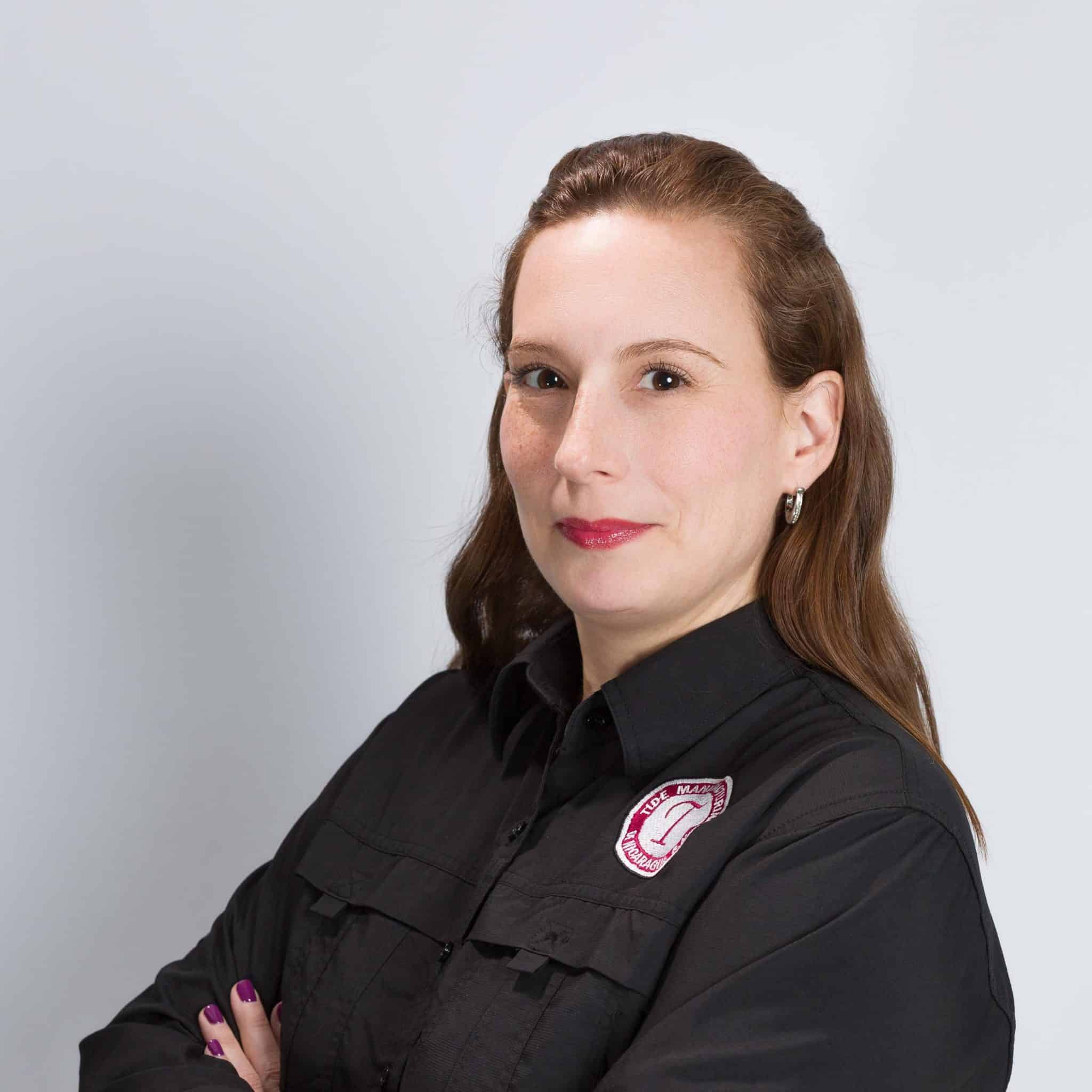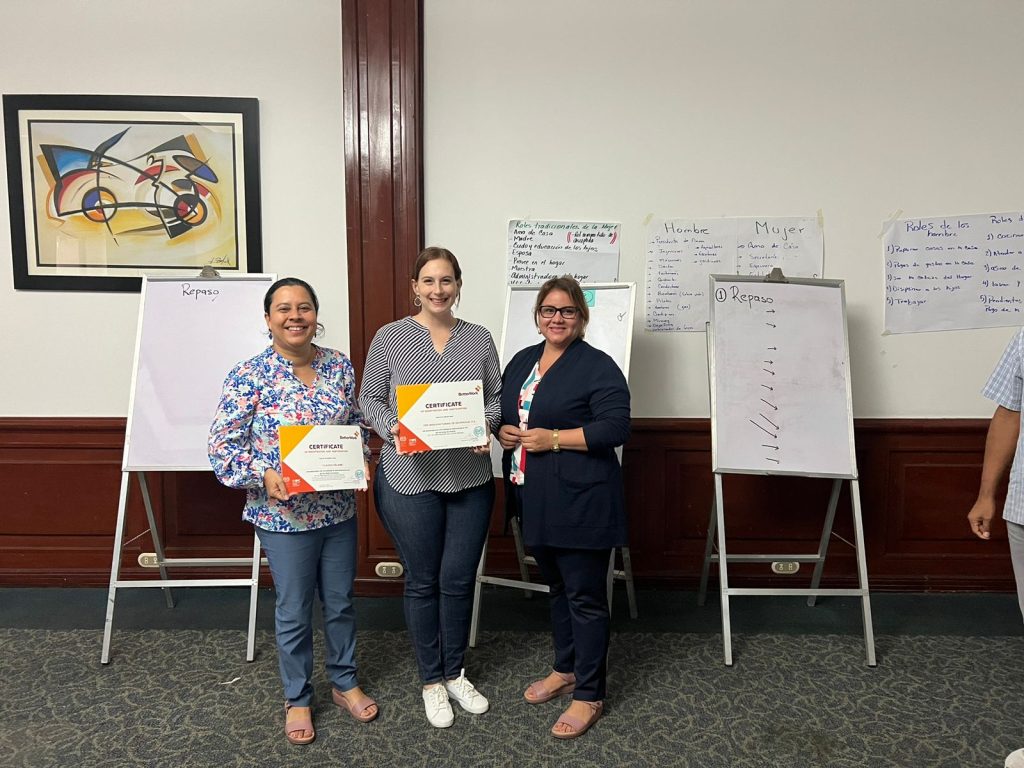An interview with Claudia Salame, one manager championing the interests of women workers in Nicaragua’s garment industry

Claudia Salame, a 20-year garment industry veteran, has been the plant manager at Tide Manufacturing in Nicaragua for nearly five years. The factory employs some 700 workers and produces athletic wear for the US market.
Claudia, a mother of four, is passionate about improving working conditions in her factory, especially for women. In this interview, we asked Claudia about her motivations, what she is trying to do for her workers, and how Better Work supports these initiatives. This conversation has been edited for clarity and brevity.
What challenges have you faced as a woman in the garment industry, and how have these challenges evolved over the years?
The garment industry has traditionally been male-dominated, and when I started over 20 years ago, it would have been a dream to think that I could be a plant manager. The biggest challenge for women in leadership has been breaking away from the stereotype that only men, particularly industrial engineers, can lead in this industry. For me, it’s been quite a journey.
What are you doing to create a more inclusive workplace for women?
Well, I think the first thing is making sure we don’t discriminate. Gender is not an issue for us when hiring for any type of job. We have really tried to be human.
At the end of the day, it doesn’t matter if you have a really nice policy about discrimination if you don’t practice what you preach. That’s when you have inconsistencies. We have implemented different initiatives to support women, including promotion from within and never discriminating.
For example, one of those subjects (of discrimination) is when you become a mother. In many other companies, once you get pregnant or become a mother, they see it as having a negative impact on the company.
We don’t see it like that. We see the need to protect her. We need to make sure she’s comfortable. We need to make sure her health is good and that her baby is good.
What have you done to support pregnant women in your factory?
Actually, Better Work’s advisers helped us with one of the initiatives. They told us about a best practice: if you put a gown or a special ID on the pregnant woman, the rest of the co-workers can be careful with them. For example, when they make a line at the cafeteria, pregnant women don’t have to join the queue.
We talked to (the expectant mothers) initially and asked, would you like to have an ID that says “Baby on Board”? They really liked the initiative. It also helps with the cooperation of the supervisor – to make sure the worker is okay, if she needs more water, or if she needs to rest.
What are some of the other ideas you have implemented?
We have our in-house doctor check up on them every 15 days or monthly, depending on the type of pregnancy. We also provide them with early dismissals at the end of a shift so that they don’t have to wait in line and aren’t uncomfortable.
Another thing that we have focused on is the period of lactation. It is very important for us. We help (new mothers) with lactation facilities and ensure they have all the best equipment available. We have our own bank for them to be able to save the milk and take it back to their babies.
We hired a specialist in this subject, and she helped us create videos explaining the benefits, technical issues, and promoting breast milk. Every time we have a pregnant worker, we show them the videos, and we help them feel comfortable with the changes and the information.
Why did you take this approach – going beyond the letter of the law in some cases?
Well, I’m a woman. I have been pregnant. I have had babies. I think it’s really part of that balance between being a mother and working. It was, I think, my way of making sure we did something that would stay beyond my involvement, and I’m confident this will not change. It’s a very good policy.
I think every factory should think about their employees and remember that at the end of the day, we’re all human, and they are the most important thing for the company.

In April, 2023, Claudia registered her factory in Better Work’s Prevention of Sexual Harassment (POSH) programme. The programme aims to create safer workplaces by addressing sexual harassment through a comprehensive approach that includes training, reporting, counselling, and evaluation.
Why did you sign your factory up for the POSH programme?
For us, this is a very important subject. Unfortunately, this industry has been very vulnerable to sexual harassment. It has not been my personal experience, but I have seen and heard stories of, especially women, having to live a true prison in their work because they’ve had to put up with sexual harassment, and they have a family to feed and don’t want to lose their job.
Once we started having the training sessions, it was a real eye-opener. They (the participants) realized how important this subject is for the company as a whole and especially to protect the most vulnerable.
The biggest benefit of the POSH programme in the company is its holistic approach. We’ve included everyone in the training – subcontractors, cafeteria staff, security guards, and customer service. We also include this training for our bipartite committee of workers and managers. I (as factory manager) am part of the POSH programme – it was my way of telling everybody this is important for everyone.
We’ve also added new ideas for reporting. For example, we have QR codes in the bathrooms. This code lets you report a hazard, harassment, and even environmental waste. We’ve tried to do this in a way that people feel they can reach us directly – with an open-door policy with HR. We’ve even used WhatsApp and TikTok to make it easier for people to understand the issue.
Would you recommend other companies to take up the training?
I definitely recommend this programme to other companies.
People are a little scared of the subject, but I would tell them how Better Work has helped us to remove emotion from it, and be very transparent and scientific. I think that anything that helps you protect your people is needed, especially on this subject of sexual harassment. Going back to ILO Convention 190** it’s something that we all, as managers, should think of and promote in our facilities.
*Violence and Harassment Convention, 2019
Supporting Women in Nicaragua’s Garment Industry – Key Statistics
In Better Work-enrolled factories (as of July 2024):